The churches were closed, the dying could not count on the last rites, and the country was henceforth considered to be forgotten by God. Archbishop Radzim Gaudenty almost destroyed Poland, all because of a certain Russian princess ...
The cathedral basilica was bursting at the seams. The Archbishop of Gniezno, Radzim Gaudenty, has already made sure that everyone whose opinion was important in the country would reach Gniezno for this extraordinary ceremony. Army commanders, princely relatives, castle administrators. And of course:all Polish bishops. The heir to the throne, Mieszko, was present. His wife, the imperial niece of Riches, appeared.
At the explicit request of the archbishop, the ruler's wife, Oda, was probably also brought in. Finally, Bolesław himself could not be missing. They were all standing in a place that looked more like a sea of rubble than the house of God. In 1018, just three months before the prince set off on his famous Kiev expedition, a fire broke out in the Gniezno cathedral. Fire ravaged the basilica and neighboring residential buildings.
And it's the time of anathema
At that time, only an unfortunate accident was seen in this incident. The convenient lie, however, could not be repeated indefinitely. On that day it was to become clear to everyone that the fire was an act of God. A warning from heaven that was not heeded.
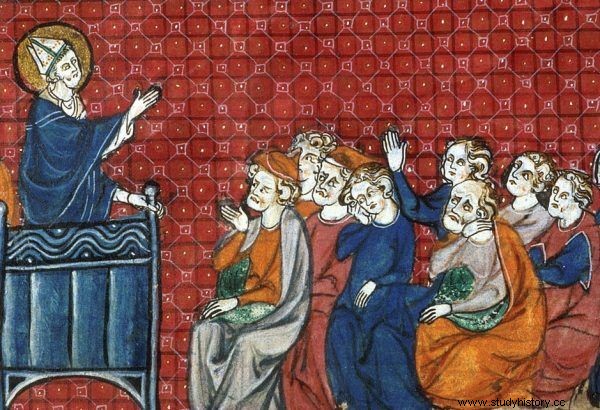
Casting his curse, Gaudenty undoubtedly made sure that the most influential people in the country of the first Piasts appeared in the cathedral (source:public domain).
The atmosphere was truly funeral, and the still unremoved damage only deepened the feeling of hopelessness. The scaffolding supported the sooty walls. Raindrops were pouring through the empty, jagged windows. The wind whipped through the cathedral unhindered. The archbishop, however, did not pay attention to the cold and damp. He stood with his back to the tomb of his brother, the martyr Wojciech.
He was surrounded by twelve priests to symbolize the apostolic group. Each was dressed in black robes and held a lighted candle in his hand. Gaudenty stepped out of that ominous circle and approached the pulpit. He rested his hand on the lectern and waited for the crowd to fall silent. When the silence was no longer disturbed by any murmur, he began to read the Latin sequences in a focused, solemn voice. The audience did not understand the words he was saying. However, they knew that these were not ordinary mass prayers.
- Anathema sit ! The archbishop finally exclaimed. Behind him these words were repeated by the twelve priests who made up the circle.
- Anathema sit ! It rang a second time. And the same voice immediately came out of the throats of the candle-holding priests.
Gaudenty cleared his throat and leaned over the pulpit. His hands were trembling, the short formula seemed to drain all of his energy. Finally, he gathered his strength and shouted in a thunderous voice a third time:
- Anathema sit !
At the same time, the priests dropped candles, which hit the stone slabs with a dull crack. They trampled them down so that no wick stays lit. As they froze motionless again, Gaudenty turned to the crowd once more. Now he was speaking Polish in a tone that could not bear any objection.
You are not allowed in…
The pontifical was unequivocal on this point. Information about anathema, its consequences and, above all, the conditions for lifting the curse, were to be exposed to the population "in its language". After all, the punishment touched the whole earth. Everything from the ruler himself to the last slave. And everyone had a right to know the reasons why he was condemned to live in a God-forsaken country.

Every inhabitant of the country was to learn that the country was anathema (source:public domain).
From that day on, the temple bells would be silent and all churches in the state would be shut down. Access to God's houses and cemeteries was forbidden. It was forbidden to celebrate Mass and administer the sacraments in an anathema-like country. Baptisms, Holy Communion, even viaticum were forbidden. There was no question of burying the dead in the Christian rite. Anyone who died during the curse would suffer eternal damnation. In life, people would be plagued by disease, drought and hailstorms. And that was still not all.
Gaudent's Anathema is known only from a brief mention by Gallus Anonymus. We can, however, reconstruct it from other general excommunications thrown during the same period. They were extremely ruthless, not to say soulless. Take at least the curse announced by the bishops at the Synod of Limoges in 1031. The faithful were forbidden to leave their homes, cut their hair, give kisses, wear comfortable clothes, and even eat meat and drink wine.
Anyone who feared God was to fast and pray constantly. Above all, he was to treat those who had led to the cursing by their lousy deeds as pagans. Gaudenty probably issued similar orders. We don't know exactly when this happened. Perhaps as early as 1020, but equally well as late as 1023 or 1024. It's easier to say who was the main culprit. That hideous sinner, drawing the wrath of God upon the entire Christian community.

By virtue of the anathema, all temples were closed by four triggers. This also applied to the cathedral in Poznań. The illustration shows her reconstruction from the book "Iron Ladies".
For what sins?
There have been many attempts to explain Gaudent's curse in a number of ways, but most of the solutions simply don't make sense. One researcher claimed, for example, that the excommunication was a result of the looting of a German church or monastery by Polish soldiers. The problem is that this is a groundless guess. No historian has informed about a similar event.
And even if it did happen, it would not be Gaudent's trouble. If anyone had a cause for protest, it was the one who was the loser. The Polish archbishop only made some money on the possible spoils taken from the war. It was thanks to them that he equipped churches, bought liturgical costumes and obtained relics. The war was as profitable for him as it was for the ruler himself.
This article has more than one page. Please select another one below to continue reading.Attention! You are not on the first page of the article. If you want to read from the beginning click here.
Another explanation is that the excommunication was thrown ... at the express request of Bolesław wishing to bring the revolted peasants to order. This theory is completely detached from reality. If Chrobry was struggling with the rebellions of his subjects, he must have known that the order of anathema would only worsen the situation. The half-pagan villagers will neither understand what followed, much less care about the curse.
Bolesław himself, on the other hand, as the ruler of the cursed country, will certainly lose the trust of his immediate surroundings. Those Christians who were directly affected by the barricades of churches and the suspension of the sacraments. The cursed prince could not count on being treated seriously in the international arena. He became, along with all his country, almost an apostate.

Thanks to the book by Kamil Janicki, you will learn about the history of the women who saved Poland. An uncompromising story of the fall of the Polish empire. Buy today with a discount on empik.com.
It was Brave that the excommunication must have caused the most serious damage, and each day of its validity additionally undermined his position. The curse also destroyed everything the monarch had worked for for three decades. As soon as he took power in Poland, he put on the garments of a faithful servant of God. He punished sinners, bought back the bodies of fallen missionaries, erected grandiose houses of prayer ... He did what he could to be seen as Christ's knight, miles Christi .
Maybe he even dreamed that after his death he would be raised to the altars and replace Wojciech as the patron saint of Poland. Now his life's work is in ruins. In the eyes of all Christian Europe, Brave has become a second pagan. He returned to his barbaric roots. The ruler certainly did not want this. But also, apparently, he was unable to stop the development of events. In all likelihood, it was him that Gaudent's curse was aimed at. He was the only messenger of the Serpent, poisoning the Lord's vineyard.
Allies turned enemies
The conflict between the prince and the archbishop had been smoldering for years. Two men in 997 were united by a common secret, not to say:a common crime. It was Chrobry who sent the Czech vagabond, Wojciech Sławnikowic, to certain death at the hands of the pagan Prussians. In turn, the missionary's brother, Gaudenty, accompanied him on the expedition, but did nothing to save the unfortunate man. His hair didn't come off his head.
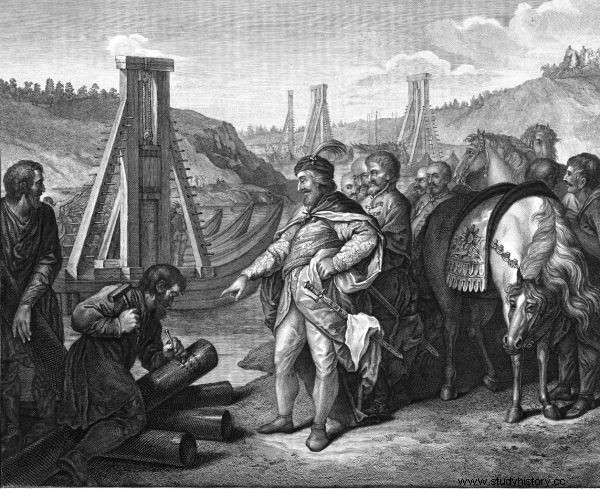
The conflict between Brave and Bishop Gaudent had been smoldering for many years. The latter, however, had to wait for the ruler's leg to collapse. Only then did he make his move. The illustration shows Bolesław the Brave from the album of Jan Kazimierz Wilczyński (source:public domain).
In mysterious circumstances, he broke free from his bonds, returned to Poland, and then ... once again went to Prussia for the body of Wojciech. And again:no harm happened to him. Wojciech was proclaimed a martyr, and Bolesław and Gaudenty built their careers on his body. Without the martyr, there would be no convention in Gniezno. The prince would not have been given the sacred spear, and the simple monk Gaudenta would not even dream of being elevated to the rank of archbishop. They both achieved everything they set out to do. Alliances paid for with blood, however, are rarely permanent and full of mutual trust.
Chrobry quickly started digging holes under Gaudenty. He brought a new missionary to the country, Bruno of Querfurt. He was a man to whom the Polish ruler owed a huge debt of gratitude. According to Błażej Śliwiński's hypothesis, Brunon in 1002 became a key intermediary between Bolesław and his rebellious teenage son Bezprym.
The latter, overwhelmed by religious mania and under the overwhelming influence of Emperor Otto III, arbitrarily joined the monastic community in Ravenna. He became a hermit and was determined to renounce all worldly temptations. Only Bruno's intervention allowed him to be snatched from the hands of the monks and returned to his father's court. Such favors are never forgotten. And indeed Bolesław treated Bruno as his closest friend. It is even possible that he thought about placing him on the archbishop's throne in Poland.
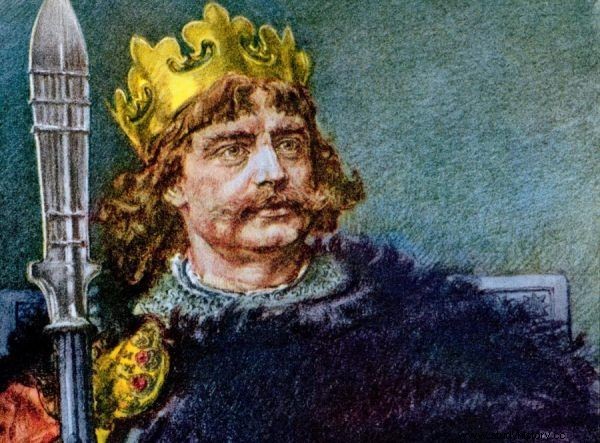
Chrobry treated Bruno from Kwerfurt as his closest friend (source:public domain).
According to some historians, he wanted to create a new church metropolis for this purpose. However, there is also a different concept. According to it, Bolesław tried to recall Gaudenty:a man he did not trust and who was much too comfortable with himself.
The growing conflict was reflected in Bruno's writings. This prolific artist had, among other things, a new life for Wojciech. He was praised for expanding the saint's figure, giving him human qualities, emphasizing the emotions that torment the future martyr ... But Bruno enriched not only the leading figure. Even more interesting things take place in the background of his story.
One step from hero to loser ...
In Gaudenta's "first life" written right after Wojciech's death, he was truly a crystal figure. A holy man, imitating his big brother in everything. Bruno's silhouette is completely different. The author directly mentions Gaudenty. He calls him "a bold pride", emphasizing that he is not fit to be a martyr, or even a priest. She also makes an ordinary crybaby out of him. The future archbishop, at least according to Bruno's text, is afraid not only of the Prussians, but even of the sea waves. He's a wimp, a fool, and a loser.
Life was created when Gaudenty was already sitting on the archbishop's throne. He was a public person by all means. In an era devoid of gossip portals, it was precisely the few books about saintly husbands that drew juicy anecdotes. As a result, Gaudenta quickly turned from a hero into a mockery of all cultural Europe.
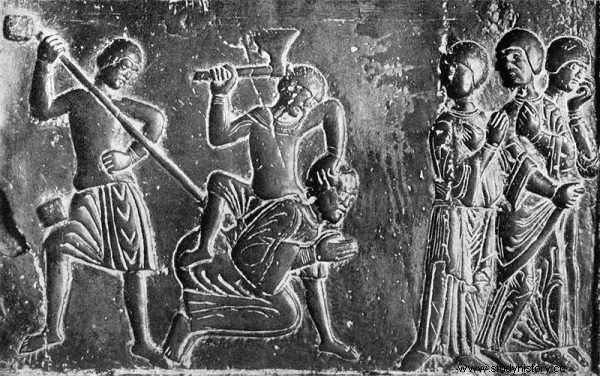
In written right after the death of St. Wojciech Gaudenta's "first life" was a crystal figure. In this by Bruno of Kferfurt, the situation was completely different. The illustration shows a fragment of the Gniezno door showing the martyrdom of St. Wojciech (source:public domain).
And there was nothing else to do about it. His image was permanently tarnished. Bolesław, meanwhile, not only did not prevent the creation of the lampoon, but he was even a kind of patron of this work . He helped in the annihilation of Gaudenty and Gaudenty was not going to forgive him the harm.
Over the years, the men barely tolerated each other. We know about Chrobry that he was always eager to use the services of bishops and abbots. It was the people of faith that he sent on the most important diplomatic missions. They were his ears and eyes in foreign lands. He made use of the bishop of Kołobrzeg Reinberna and the Poznań shepherd, Unger. In turn, Abbot Tuni was considered to be one of his closest advisers.
Only about the cooperation between the prince and the archbishop, nothing is heard at all. Chrobry acted as if Gaudenty didn't exist. And maybe that was his mistake, because you should always keep an eye on not your friends but, most of all, your enemies. The archbishop, meanwhile, was just waiting for an opportunity to take revenge.

Thanks to the book by Kamil Janicki, you will learn about the history of the women who saved Poland. An uncompromising story of the fall of the Polish empire. Buy today with a discount on empik.com.
Revenge will be sweet
He had to be patient. A whole decade passed, and Chrobry was still invincible. It seemed that nothing could stop him ... Until finally Kyiv happened. In 1018, the prince lost hundreds of soldiers to the east. He did not manage to permanently subjugate the Rus', and in addition - against God's law and with insolence worthy of a Persian satrap, among other treasures he also brought himself a distinguished concubine.
It was Przedsawa:a Ruthenian princess whom Bolesław first raped to emphasize the scale of his victory, and then made her a courtesan. Everyone knew about its existence:Bolesław finally boasted that he had abused her in the bed room in the same way as he had previously slashed one of the Kiev gates with his sword. In war, such acts of revenge and demonstrations of power occurred frequently. Bolesław, however, indulged himself further. And this despite the fact that his wedding wife - Oda Miśnieńska was waiting for him at home.
If Gaudenty wanted to move from cursing to action, this was the perfect opportunity. It is not known whether he himself saw this vulnerability in defense. If there is even a grain of truth in Bruno's image of the archbishop, then Gaudenty should be considered a backer, or even a coward. A man who, without an external stimulus, without a stronger person taking the role of a helmsman, would not be able to openly rebel against the ruler. Fortunately, he didn't have to look far for such a persona.
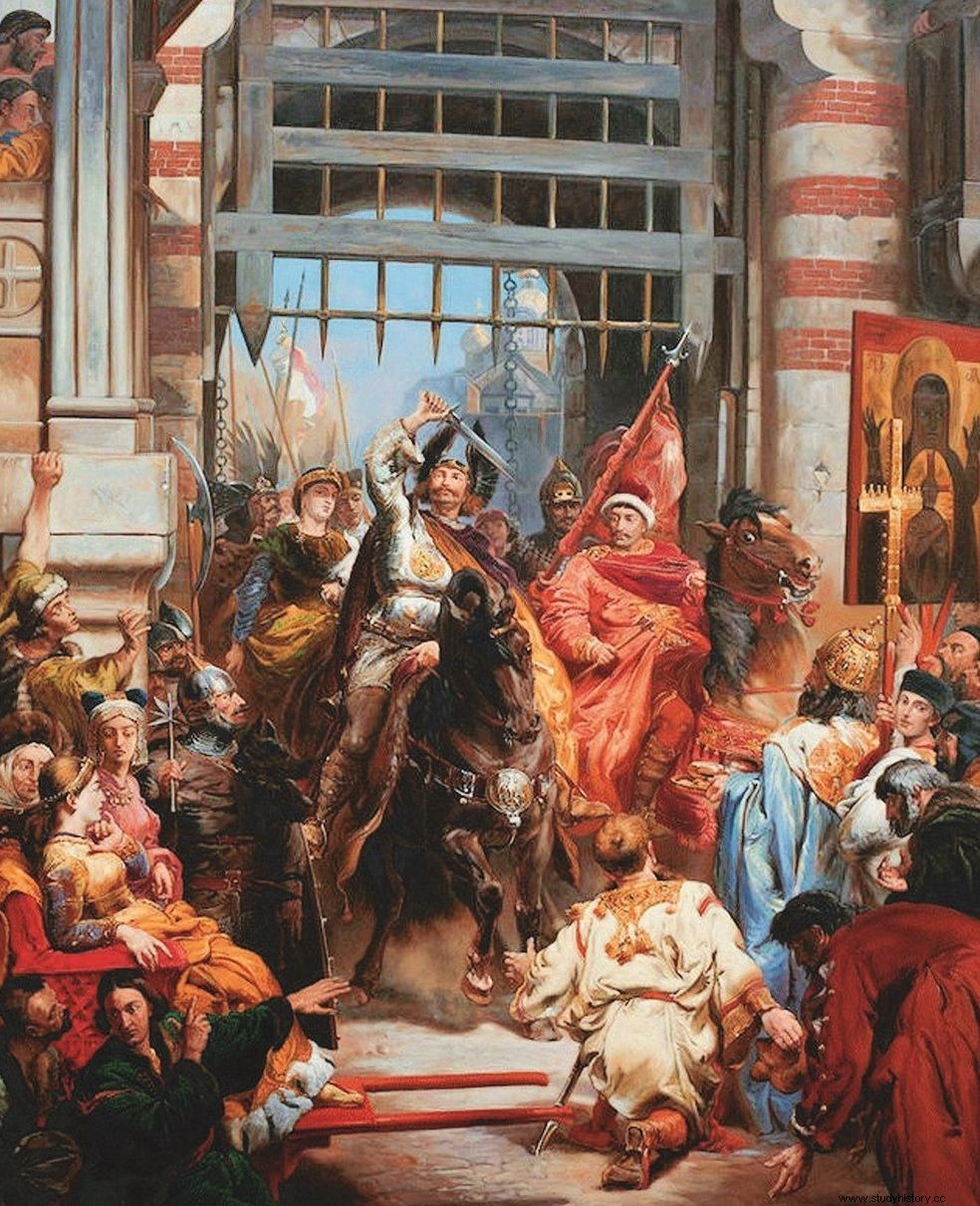
A painting by Jan Matejko showing Brave's entry into Kiev. Przedsawa is sitting in the litter (source:public domain).
Presław was one of the players in Ruthenian politics years ago. She put the pieces on the chessboard, captured pieces, was not afraid to sacrifice human lives ... Years of captivity may have blunted her will to fight, but they did not free her cynicism and cunning. Now that her anger was finally heard, she knew exactly what she had to do. She made contacts with the archbishop. Perhaps they met in person in Ostrów, or perhaps exchanged letters through trusted intermediaries. A despised woman and an archbishop. It didn't take more to shake the position of the ruler.
Bigamy. This is the real justification for the excommunication. The chronicler Thietmar mentioned the wave of indignation that swept across Germany in connection with Bolesław's public romance. The Christian chief - a pillar of morality that condemns other adulterers to public castration - brought himself a captive, "shamelessly forgetting about his wedding wife." Deaf to the admonitions of the clergy, he lived from then on with two wives. And it was these wives who led him to his downfall. Gaudent's curse was, to an equal or greater degree, the curse of Oda and Pre-Slava.
Bibliography:
The article was based on materials collected by the author during the work on the book "Damy z skazą. The women who crowned Poland " . Full bibliography in the book.
